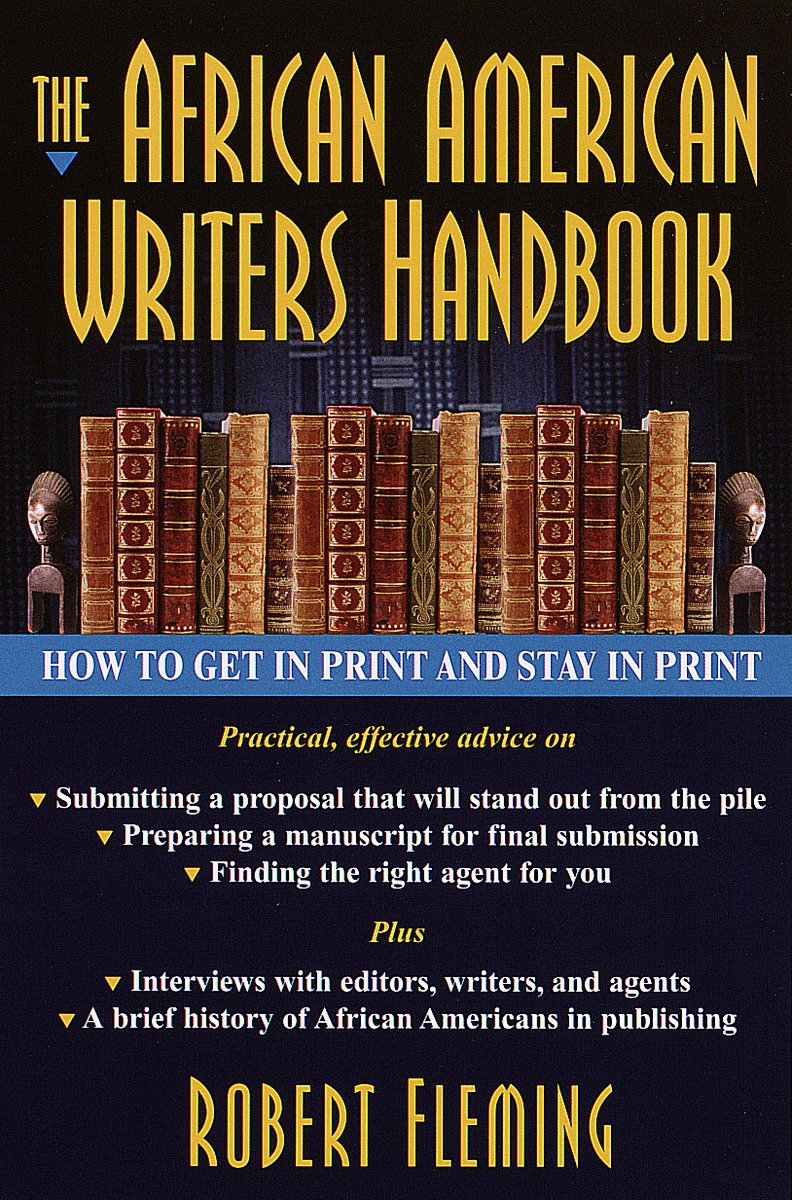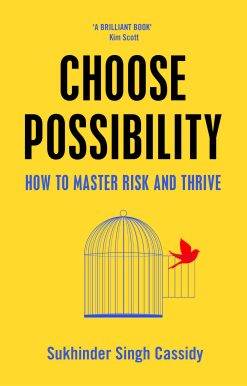The African American Writer’s Handbook: How to Get in Print and Stay in Print
15.00 JOD
Please allow 2 – 5 weeks for delivery of this item
Description
With African Americans writing and buying books in record numbers, the time is ripe for a comprehensive publishing guide tailored expressly to the needs of this vibrant, creative community. The African American Writers Handbook meets this challenge perfectly. Written by veteran journalist and published author Robert Fleming, this book gives writers the heart, the determination, and above all the crucial information to publish successfully in this highly competitive field. Knowing the inner workings of the publishing industry provides any writer, novice or veteran, with a much needed advantage in the quest to get into print. Inside you’ll find- A complete, step-by-step guide to every aspect of the publishing process, from the germination of a winning idea to the nuts and bolts of book production- Tips on submitting proposals, query letters, and preparing manuscripts for submission- Advice on negotiating contracts that extend careers- How to use on-line resources for research and profit- Interviews with top editors, agents, publishing executives, and bookstore owners- Updated information on copyrights, subsidiary rights, sales and marketing- The trials and triumphs of self-publishing- The art of promoting your work and yourself to a wider audience- An insider’s look at the economic realities of the book business- And much more!Here, too, are scores of inspiring interviews and capsule biographies of leading African American writers both past and present. How did Richard Wright become America’s first bestselling black writer? How did Zora Neale Hurston break through the artistic boundaries of the Harlem Renaissance long after her death? What was Toni Cade Bambara doing before she sold her first book? Why should Ann Petry, William Gardner Smith, Nella Larson, and William Melvin Kelley be revered wherever African American literature is read? Blending practical information and fascinating anecdotes with a mini literary history of African American writing, this upbeat, savvy, essential guide is a publishing primer with soul.
Additional information
| Weight | 0.4 kg |
|---|---|
| Dimensions | 2.6 × 14 × 21 cm |
| PubliCanadation City/Country | USA |
| by | |
| Format | Paperback |
| Language | |
| Pages | 352 |
| Publisher | |
| Year Published | 2000-4-4 |
| Imprint | |
| ISBN 10 | 0345423275 |
| About The Author | Robert Fleming has written for Essence, Black Enterprise, The Source, and the New York Times, among others. A former award-winning reporter for the New York Daily News, he is the author of The African American Writer’s Handbook and The Wisdom of the Elders. His work was featured in Brown Sugar and he was the editor of After Hours. |
| Excerpt From Book | THE PUBLISHING INDUSTRY TODAY “At its best, publishing is one of the crucial elements of our culture. It possesses the most potential for presenting the work of our best minds to the masses at a time when their creativity and vision are very much needed.” —JOE WOOD Editor, The New Press There has never been a better time for African American writers in the history of American publishing, with so many books coming from such a wide range of black creators on almost every topic imaginable. Black writers, for the most part, have made the critical adjustment to view the publishing industry as a business, understanding the need to merge their art with the demands of the consuming public. Although they want, like all writers, to get their work into print, they comprehend that the publishing industry is in a state of intense transition, that creativity and imagination will not guarantee a successful career when the level of competition among both publishers and writers has greatly increased. Still, a substantial number of African American writers are getting published and carving out an ever-growing share of the reading market. Indeed, times have changed drastically for the publishing world. The formerly genteel pastime for gentlemen is now a high-risk, big-stakes business. Corporate publishers are wrestling with the pressing question of what to do with the present stagnancy of growth in overall readership in the face of competition for recreational space with the Internet, cable TV, movies, and video games. With increasing foreign ownership of American publishers, one fear has been that mergers will spell the end of the midlist author, who sells far fewer books than the marquee author. Half of the top twenty American publishing houses are foreign owned, comprising a 28 percent share of the market. The publishers say that they want to acquire good books that hold their own in the marketplace. But what sells? Few, if any, guarantees prevail in the publishing world; no book seems to be a certain sell-through, for even many of the brand-name authors have suffered dips in their sales numbers. According to the 1998 Consumer Research Study on Book Purchasing, the unit purchases of adult books in 1998 fell 2.8 percent to 1.04 billion last year. The 1997 unit sales figures had moved up by less than 1 percent. Even mass-market paperback sales slid to a new low, tallying up the biggest drop in book units, nearly two-thirds of the decline. Hardcover sales also fell, but trade paperback sales held steady. One theory is that there are books on every subject under the sun and too many books are being published. Some critics of the industry insist that a portion of the business's woes can be placed on bad judgment in title acquisitions, poor management, and an overemphasis on celebrity books, which often are purchased with huge advances. Publishing executives, aware of the complaints, have moved quickly to tighten their spending, keeping a closer watch on the editorial, production, and promotion departments—no more lavish parties or other costly job perks. Because it is now understood that two or three of these megabooks purchased with huge advances can affect the fortunes of an entire publishing house, the matter of author compensation is under closer scrutiny. However, not all in the industry are convinced that the present situation is as dire as many pundits would have us believe—that is, that the entire business is just minutes away from a total economic collapse. Some industry analysts say it's simply a major reassessment and readjustment in how the industry operates in a highly competitive society where leisure time is often impulsive or determined by discretionary income. Many of those who monitor the publishing industry are optimistic, despite some significant changes: The consolidation of independent distributors and wholesalers and a loss of overall competition The shrinkage in the number of independent booksellers and fewer options for the discerning book buyer The growth and dominance of the large bookselling chain stores in almost every major national region The consolidation of the major publishing houses, resulting in fewer outlets for writers and agents, and a reduction in publishing slots The widespread view within the industry of the author as a business commodity and no longer as a mysterious, glamorous artist, leading to a major policy change in the publicizing and promoting of published writers. With over 63,000 books published yearly, no one will tell you that all of them are volumes of quality or substance, or possess real commercial potential. The new push in the industry is to locate, cultivate, and grow new markets among the nation's very diverse readership. Some efforts have been hit-or-miss, such as to exploit the exploding Latin market, but other markets have shown some promising results—the Asian and African American audiences, along with the lucrative gay readership. And the editors are scouting for new readers in previously silent communities, hoping to bring them cost-effectively into the mainstream. While article after article proclaims that the industry is no longer about publishing what is good but instead is focused on what can show a profit, it would be foolish to regard every book printed as a product of greed or to think that publishers care for nothing beyond achieving the largest possible market share. Among many of the publishing houses, there exists a staunch commitment to publishing books that make a difference, to taking artistic and commercial risks. Some true prestige is added into the industry when a house finds a work that is both literate and highly commercial. In fact, many houses use the large profits of their front-line, bestselling authors to bankroll more challenging titles that promise a limited audience. This approach is also taken for the benefit of first novels, poetry from new voices, and nonfiction for a specific niche market. The fear is that limited consumer demand may end the days of publishers as advocates of provocative, cutting-edge art, despite these supposed glory days of a sound economy and more disposable income. Will the ongoing merging of the large mainstream publishers really transform the business and lift its artistic sights? Will reorganization and downsizing help matters? Will the reduction of overhead costs, the merging of departments, and the slashing of staff really help to sell more books? What will happen to the books of dialogue, debate, and discourse? Will bigger equal better? Unfortunately, the hardcover may cease to be the spine of the publishing business, especially if the electronic book catches on. Still, there are those readers who will never tire of buying and handling the traditional format of a book, despite the conveniences of technology. For the worker bees of publishing—the people who edit, design, and produce the books—nothing can ever replace the joy of witnessing the evolution of an unedited manuscript to a handsomely printed book. They fear they're witnessing the passing of a Golden Age where the art and craft of book editing, design, and production will be soon forgotten. The problem here is that the book, a product born of the creativity and imagination of the writer, must rely on the buying habits of the reader. Yes, even your number-one bestsellers do not produce the kind of box-office revenue that hit films generate, but something will be tragically lost if the profit motive completely dominates the acquisition process of the publishing world. Many fewer titles will be published, and the bar of quality may be lowered to accommodate popular appetites. But commercial trends are fleeting and fickle. However, one thing is certain. No matter what adjustments are made within the publishing industry, the future of books is not as precarious as some naysayers would have you believe. Two real indications of health within the industry are the rapid growth of various regional bestseller lists throughout the country and the Oprah Book Club phenomenon; both trends show that people are continuing to read books in significant numbers. Publishing has become the realm of the commercially targeted book, which is a good thing in that more areas of the American reading public are being serviced than ever before. And African Americans, who are among these targeted groups, are seeing more diversity in the range of books being offered. Yes, black writers are becoming more visible throughout the evolving publishing business. We must work even harder to make our presence felt all throughout the industry— as writers, editors, publicists, sales personnel, management, and publishers. The time is right for a greater push in all of these areas. In the final analysis, good books are still published and continue to find their way into the hands of those people who love them. A PARTIAL LIST OF MAJOR AMERICAN PUBLISHERS This select list of the more important publishing houses can assist you in targeting the appropriate company for your submission or query. Many of the bigger houses publish books under several imprints, so it's essential to research them to find the best home for your work. Trade Hardcover Houses Addison-Wesley Ballantine Bantam Doubleday Dell Basic Books Beacon Books Carol Publishing Crown DoveBooks E. P. Dutton Farrar, Straus and Giroux The Free Press Grove/Atlantic Harcourt Brace HarperCollins Henry Holt & Co. Houghton Mifflin Hyperion Alfred A. Knopf Little, Brown & Co. Macmillan Publishing Co. William Morrow & Co. The New Press W. W. Norton & Co. Pantheon Books Penguin Putnam Random House St. Martin's Press Scribner Simon & Schuster Times Books Villard Walker & Co. Warner Books Mass-Market Houses Avon Ballantine/Del Rey/Fawcett/Ivy Bantam Berkley Dell Harper New American Library/Signet/Onyx Pocket Warner Zebra “It is one of the tragedies of life that one cannot have all the wisdom one is ever to possess in the beginning. Perhaps, it is just as well to be rash and foolish for a while. If writers were too wise, perhaps no books would be written at all. It might be better to ask yourself ‘Why?’ afterwards than before. Anyway, the force from somewhere in space which commands you to write in the first place, gives you no choice. You take up the pen when you are told, and write what is commanded. There is no agony like bearing an untold story inside you.” —Zora Neale Hurston From Dust Tracks on a Road |
Only logged in customers who have purchased this product may leave a review.






Reviews
There are no reviews yet.